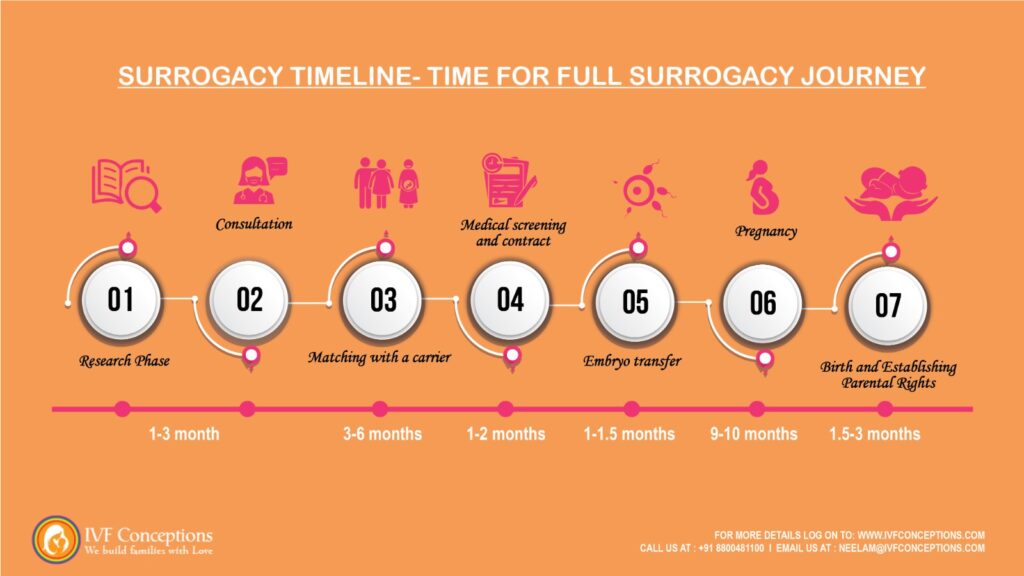Gestational Surrogacy: A Definitive Guide

Gestational Surrogacy: A Step-by-Step Guide to Intended Parents
The Gestational Surrogacy process in 2025 remains a detailed and intricate journey for both intended parents and surrogates. As surrogacy laws evolve and medical advancements improve success rates, understanding the gestational surrogacy timeline and the cost of gestational surrogacy in 2025 is more important than ever. Whether you’re an intended parent looking to grow your family or a surrogate embarking on this rewarding path, this guide will provide you with the latest insights into legal gestational surrogacy requirements and what to expect in the coming year.
- Book an online appointment: Get a free online consultation.
- Call\W:+91-8800481100 Email:neelam@ivfconceptions.com
Surrogacy has emerged as a hope for individuals and couples facing fertility challenges, medical conditions, or those who are part of the LGBTQ+ community. It offers an opportunity for people to experience the joys of parenthood and an opportunity to have a biological child, regardless of the hurdles that may stand in their way.
More Resources to Read:
Infertility Treatment and Surrogacy Process
9 Factors To Improve IVF Pregnancy Rate
International Surrogacy Options Worldwide
Surrogacy Guide for Surrogate Mothers
This article serves as your compass through this complex journey. We’ll explain the intricacies, potential challenges, and the importance of approaching surrogacy with knowledge and care.

Understanding Gestational Surrogacy Process
Surrogacy is a multifaceted journey, often driven by deeply personal motivations. To embark on this step-by-step guide to the surrogacy process, it’s crucial to begin by comprehending what surrogacy is and the various forms it can take.
Defining of Surrogacy and meaning of surrogacy
At its core, surrogacy is a compassionate act of carrying and giving birth to a child for individuals or couples who, for various reasons, are unable to do so themselves. Surrogacy serves as a pathway to parenthood, allowing those who face fertility challenges or medical conditions to fulfill their dreams of having a family.
There are two primary forms of surrogacy:
1. Traditional Surrogacy: In traditional surrogacy, the surrogate mother is genetically related to the child she carries. This means that her own egg is used in the conception process, typically through artificial insemination. Traditional surrogacy is less common today due to the complexities it can introduce in terms of legal and emotional ties.
2. Gestational Surrogacy: Gestational surrogacy, on the other hand, is the more prevalent form. In this case, the surrogate has no genetic connection to the child. The embryo is created using the egg and sperm of the intended parents or donors and is then implanted in the surrogate’s uterus. This form of surrogacy is often the preferred choice due to its reduced legal and emotional complications.
Gestational Vs Traditional Surrogacy

Indication for Surrogacy Process
People choose surrogacy for a variety of reasons, each deeply personal and often stemming from challenging circumstances. Here are some of the primary motivations behind opting for surrogacy:
1. Infertility: For many, surrogacy is a lifeline when infertility stands in the way of biological parenthood. It provides an opportunity for individuals and couples to experience the joys of raising a child when natural conception is not possible.
2. Medical Conditions: Some individuals face medical conditions that make carrying a pregnancy risky or impossible. Surrogacy allows them to have biological children without endangering their own health.
3. Same-Sex Couples: Surrogacy is a particularly important option for same-sex couples, where both partners may have a genetic connection to the child. It allows them to become parents and share in the journey of pregnancy and childbirth.
4. Preventing Genetic Disorders: In cases where there is a risk of passing on genetic disorders to the child, surrogacy can offer a solution. Intended parents can choose to use donor eggs or sperm to avoid such hereditary issues.
5. Fertility Preservation: Some individuals may choose surrogacy as a means of preserving their fertility for future family planning. This can be important for career-focused individuals or those who wish to delay parenthood.
Understanding these motivations is crucial for anyone considering surrogacy, whether as an intended parent or a surrogate.

Surrogacy Legalities/Surrogacy Guide
The surrogacy process is not just a medical and emotional journey; it is also a highly regulated legal path. Understanding the legalities of surrogacy is essential for both intended parents and surrogates to ensure a smooth and ethical experience. In this section, we’ll explore the legal aspects and considerations involved.
- Regulations Vary by Location
One of the most critical aspects of surrogacy is that regulations can vary significantly depending on your location. Surrogacy laws can differ from one state or country to another, making it imperative to understand the legal landscape in your area.
- International Surrogacy Countries
For those considering international surrogacy, it’s vital to recognize that some countries may have restrictive or even prohibitive laws regarding surrogacy. In contrast, other nations are more surrogacy-friendly and offer established legal frameworks to protect all parties involved.
- State-Specific Regulations
In the United States, surrogacy laws vary from state to state. Some states have comprehensive surrogacy laws that provide clarity and protection for intended parents and surrogates, while others may have limited or outdated regulations. Understanding the laws in your specific state is crucial to navigating the surrogacy process legally.
- Legal Agreements
One of the core components of surrogacy involves the creation of legal agreements. These agreements, often referred to as “gestational carrier agreements” or “surrogacy contracts,” outline the rights, responsibilities, and expectations of all parties involved.
These agreements typically cover:
· Parental Rights: Clarifying the parental rights of the intended parents and ensuring that the child born through surrogacy legally belongs to them.
· Surrogate Compensation: Defining the compensation and expenses that the surrogate will receive during the surrogacy process.
· Medical Decision-Making: Establishing the surrogate’s consent for medical procedures and decisions during the pregnancy.
· Contact and Communication: Outlining the intended parents’ access to the surrogate and her medical updates.
Surrogacy Legal Experts
Navigating the legalities of surrogacy is a complex and highly specialized field. It’s strongly advised to seek the expertise of attorneys with experience in reproductive law. These legal professionals can guide you through the legal aspects, help draft the necessary agreements, and ensure that all parties’ rights are protected.
Legal expertise is not an area to cut corners. Having a well-versed attorney can prevent potential legal complications down the road and provide peace of mind throughout the surrogacy process.

Choosing the Right Surrogacy Agency
Selecting the right surrogacy agency is a pivotal decision in your journey toward parenthood or becoming a surrogate. The agency you choose will play a significant role in guiding you through the complex surrogacy process. To make an informed choice, consider the following criteria:
· Experience and Reputation
Begin by researching surrogacy agencies with a proven track record. Look for agencies with years of experience in assisting intended parents and surrogates. A reputable agency will have a history of successful surrogacy journeys and satisfied clients.
· Success Rates
Inquire about the agency’s success rates. A high success rate indicates that the agency has a strong network of qualified surrogates and a well-organized process. It’s essential to partner with an agency that can maximize your chances of successful surrogacy.
· Client Testimonials
Reading client testimonials and reviews can provide valuable insights into the agency’s performance. Testimonials often reveal the level of support, transparency, and satisfaction that clients have experienced.
· Comprehensive Services
A reliable surrogacy agency should offer a range of services to support you throughout the journey. These services may include matching services, legal support, medical guidance, and emotional counseling. Ensure that the agency you choose provides a comprehensive package to meet all your needs.
· Transparent Costs
Understanding the financial aspects of surrogacy is crucial. Look for an agency that provides transparent information about costs, including surrogate compensation, medical expenses, legal fees, and agency fees. Clarity on the financial aspects helps you plan your surrogacy journey effectively.
· Personal Compatibility
Your surrogacy agency should be an organization with which you feel comfortable and can communicate openly. Personal compatibility is essential as you’ll be working closely with the agency throughout the surrogacy process. Trust and clear communication are vital components of a successful surrogacy journey.
· Ethical Standards
Ensure that the surrogacy agency adheres to high ethical standards. It should prioritize the well-being and rights of both intended parents and surrogates. Ethical agencies promote a safe, fair, and positive surrogacy experience for all involved.
· Legal Expertise
A good surrogacy agency should have legal experts or connections with legal professionals who specialize in reproductive law. This ensures that the legal aspects of surrogacy, such as creating gestational carrier agreements, are handled correctly and ethically.
By carefully considering these criteria, you can make an informed decision when choosing a surrogacy agency. Remember that the agency you select will be your partner throughout the entire surrogacy journey, providing guidance, support, and expertise.

The Surrogacy Process: Step-by-Step Guide
The surrogacy process is a journey filled with hope, challenges, and ultimately, the creation of new families. It’s a collaborative effort between intended parents and surrogates, each playing a crucial role in bringing a child into the world. In this section, we will provide a surrogacy process step-by-step guide, offering insight into the various stages and important considerations along the way.
Following are steps of the surrogacy process for intended parents
1. Initial Consultation/Surrogacy Guide
The journey begins with an initial consultation between the intended parents and the surrogacy agency. During this meeting, you’ll have the opportunity to discuss your expectations, ask questions, and learn more about the surrogacy process. This is the moment to establish a relationship built on trust and shared understanding.
2. Medical and Psychological Evaluations
One of the essential steps in surrogacy is the medical and psychological evaluations. Both the surrogate and the intended parents will undergo thorough medical examinations and psychological assessments to ensure that they are physically and emotionally prepared for the journey.
These evaluations are crucial to confirm that the surrogate is in good health and capable of carrying a pregnancy to term. Similarly, intended parents may receive counseling to help them navigate the emotional aspects of surrogacy.
3. Matching Process/Types of Surrogacy
The matching process is a pivotal stage in surrogacy. The agency will work to match the intended parents with a suitable surrogate. Compatibility, shared expectations, and open communication are key factors in this process. Establishing a strong bond and understanding between the parties involved is crucial for a successful surrogacy journey.
4. Legal Contracts
Legal agreements are a cornerstone of surrogacy. These contracts, often known as gestational carrier agreements or surrogacy contracts, outline the rights, responsibilities, and expectations of both the intended parents and the surrogate. They typically cover parental rights, surrogate compensation, medical decision-making, and contact and communication.
These agreements are legally binding and serve to protect the interests of all parties involved.
5. Fertility Treatments
Once the legal contracts are in place, the medical aspect of surrogacy comes into focus. Fertility treatments, such as in vitro fertilization (IVF), are utilized to create embryos using the intended parent’s genetic material or donor material. The resulting embryos are then transferred to the surrogate’s uterus.
This stage is a significant milestone in the surrogacy process, as it marks the beginning of the pregnancy journey.
6. Pregnancy and Prenatal Care
Throughout the pregnancy, the surrogate will receive comprehensive prenatal care to ensure the well-being of both the surrogate and the developing baby. Regular medical check-ups, prenatal vitamins, and necessary medical interventions are part of this stage.
Open communication between the surrogate and intended parents is key, as they share in the excitement and concerns of the pregnancy.
7. Childbirth and Delivery
The culmination of the surrogacy journey is the childbirth and delivery. The birthing process is a momentous occasion, and the surrogate plays a critical role in ensuring a safe and healthy delivery. Intended parents are typically present during the birth, witnessing the arrival of their child.
8. Post-Birth Legal Procedures
Following the birth, there are essential legal steps to complete the surrogacy process. These procedures are designed to establish the parental rights of the intended parents. It is vital to ensure that all documentation is in order to protect the child’s legal status.
overview of the surrogacy process: Stages of the surrogacy process along with an approximate timeline for each step:
| Stage | Time Taken (Approx.) |
| 1. Initial Consultation | Varies based on scheduling and availability |
| 2. Medical and Psychological Evaluations | 4-6 weeks |
| 3. Matching Process | Varies, typically 1-3 months |
| 4. Legal Contracts | 2-3 months |
| 5. Fertility Treatments | 2-4 months (dependent on the IVF process) |
| 6. Pregnancy and Prenatal Care | Approximately 9 months |
| 7. Childbirth and Delivery | On the due date, may vary |
| 8. Post-Birth Legal Procedures | 2-3 months |
Please note that these timeframes are approximate and can vary based on individual circumstances, including legal requirements, medical factors, and the time it takes to find a suitable match. It’s essential to approach the surrogacy process with flexibility and patience.
Benefits and Challenges of the Gestational Surrogacy Journey
The surrogacy process is a journey that offers numerous benefits, but it’s not without its unique challenges. To make an informed decision about embarking on this path, it’s essential to understand both the advantages and potential obstacles.
Benefits of Gestational Surrogacy
1. Fulfilling Parenthood Dreams: Surrogacy provides a way for individuals or couples to become parents when they face infertility issues, medical conditions, or other barriers to natural conception. It offers the opportunity to create a loving family.
2. Genetic Connection: In cases of gestational surrogacy, intended parents can have a genetic connection to their child. This can be especially meaningful for those who wish to have a biological link with their offspring.
3. Control and Involvement: Intended parents have the opportunity to be closely involved in the pregnancy journey. They can attend medical appointments, be present during childbirth, and play an active role in their child’s life from the very beginning.
4. Medical Advancements: Surrogacy benefits from advances in reproductive medicine, including in vitro fertilization (IVF). These technologies enhance the success rates of surrogacy and broaden options for intended parents.
5. Diverse Family Structures: Surrogacy is inclusive of all family structures, including same-sex couples and single individuals. It allows them to experience the joys of parenthood.
Challenges of Surrogacy
1. Emotional Complexities: The surrogacy journey can be emotionally intense for all parties involved. The surrogate may experience a range of emotions, and intended parents may also face challenges in coping with the process.
2. Legal Complications: Navigating the legal aspects of surrogacy, including agreements and parental rights, can be complex. It’s crucial to engage with experienced reproductive law attorneys to ensure that all legal requirements are met.
3. Financial Costs: Surrogacy can be expensive, encompassing surrogate compensation, medical expenses, agency fees, legal fees, and more. Financial planning is essential to cover these costs.
4. Medical Risks: While surrogacy is generally safe, there are inherent medical risks associated with pregnancy. Surrogates and intended parents should be prepared for potential health complications and have access to comprehensive medical care.
5. Psychological Support: Emotional support and counseling are critical for surrogates and intended parents. Dealing with the emotional aspects of surrogacy can be challenging, and professional guidance is essential.
6. Ethical and Moral Considerations: Surrogacy raises ethical and moral questions for some individuals and communities. It’s important to consider personal beliefs and values in the surrogacy decision-making process.
Additional guide for intended parents:
Best surrogacy agency in India
Best surrogacy agency in Mexico
Best surrogacy agency in Colombia
Best surrogacy agency in Argentina
Best surrogacy agency in Georgia
Best surrogacy agency in the USA
Best surrogacy agency in Ukraine
Best surrogacy agency in Armenia
Conclusion
In conclusion, surrogacy is a journey filled with hope, love, and the potential for building families. It’s a process that requires careful planning, ethical considerations, and adherence to legal regulations. With the right knowledge and support, surrogacy can be a positive and life-changing experience for all parties involved.
When considering the surrogacy process as a way to build your family, understanding the associated costs is crucial.
Surrogacy expenses encompass various elements, including surrogacy agency fees, medical procedures, legal costs, surrogate compensation, and additional expenses such as insurance and travel.
These expenses can vary significantly, making it important for intended parents to plan their budget carefully.
While surrogacy involves a financial investment, it presents a unique opportunity for individuals or couples to fulfill their dream of parenthood.
It’s advisable to seek guidance from surrogacy agencies and legal professionals to navigate the financial aspects of this transformative parenthood journey effectively.
If you have any further questions or seek additional information, please feel free to reach out. We are here to support you every step of the way.
If you’d like to learn more about IVF, Egg Donation, or surrogacy services globally, check out the rest of our website at Complete Surrogacy Agency. We offer legally secure and affordable surrogacy consulting services for FREE.
For more resources on IVF and Surrogacy, browse our other web page- IVF Conceptions.
For more resources on IVF and Surrogacy, browse our other web page- Georgia Surrogacy Agency.
Complete Surrogacy: Your Trusted Partner in International Surrogacy
At Complete Surrogacy, we have over 15 years of experience in international surrogacy, guiding 4,000+ intended parents worldwide. We provide safe, ethical, and affordable surrogacy solutions for single parents, LGBTQ+ couples, and heterosexual couples.
As members of EFS and ESHRE, we adhere to the highest ethical and professional standards. Our expert team is committed to providing accurate, compassionate, and transparent guidance, ensuring a legally secure and smooth journey to parenthood.
Let us help you build your family with trust, care, and integrity.
Get in touch for one FREE Surrogacy Consultancy!
Our team includes experts from diverse backgrounds with leading reproductive attorneys, professionally trained top fertility doctors, former surrogacy case managers, experienced and kind surrogate mother and egg donor coordinators, mental health professionals specializing in infertility counseling, and a logistic support team to assist you in your chosen surrogacy country.
References used:

Frequently Asked Questions – What is the Surrogacy Process?
What is the surrogacy process?
The surrogacy process is a method of assisted reproduction where another person, known as the surrogate, carries a pregnancy on behalf of the intended parent(s). It involves fertilizing an embryo through IVF and transferring it to the surrogate’s uterus.
2. How does gestational surrogacy work?
Gestational surrogacy is the most common type of surrogacy. In this process, the intended mother’s or egg donor’s eggs are fertilized with sperm from the intended father or a sperm donor through IVF. The resulting embryo is then transferred to the gestational surrogate’s uterus.
What are the steps involved in the surrogacy process?
The surrogacy process typically involves several steps. These steps can vary depending on the specific situation, but generally include:
– Finding a surrogate or surrogacy program
– Matching process between intended parents and surrogates
– Legal contracts for the surrogacy arrangement
– Medical procedures such as egg retrieval, fertilization, and embryo transfer
– Monitoring the surrogate’s pregnancy through ultrasounds
– Birth of the child and legal parenthood
How long does the surrogacy process usually take?
The length of the surrogacy journey can vary depending on individual circumstances. On average, it can take anywhere from 12 to 24 months to complete the entire process, from the initial decision to the birth of the child.
What is the gestational surrogacy process?
Surrogacy is a method where a woman carries and delivers a baby for another person or couple, often due to infertility.
How long does the surrogacy process take?
The surrogacy process typically takes 12-18 months, including matching, legal processes, pregnancy, and post-birth procedures.
How to start the surrogacy process?
Begin by researching surrogacy agencies, consulting with a reproductive specialist, and understanding the legal requirements.
How does the surrogacy process work?
It involves selecting a surrogate, completing legal agreements, fertility treatments, pregnancy, and legal parentage establishment.
How to start the IVF surrogacy process?
Start by finding a reputable surrogacy agency or clinic, and consult with professionals to guide you through the process.
What is the process for surrogacy?
The surrogacy process includes selecting a surrogate, medical assessments, legal agreements, pregnancy, and post-birth procedures.
How long is the surrogacy process?
The surrogacy journey typically lasts 12-18 months from initial consultations to the birth of the child.
How much is the surrogacy process?
Surrogacy costs can vary widely but often range from $60,000 to $150,000, depending on various factors.
How much does the surrogacy process cost?
The cost of surrogacy varies, but it commonly falls within the range of $60,000 to $150,000, including agency fees, medical expenses, and legal costs.
References:
1. American Society for Reproductive Medicine – Third-party reproduction
2. American Pregnancy Association – Surrogacy
3. Resolve – The National Infertility Association – Gestational Surrogacy

Author Bio: Neelam Chhagani is an International Surrogacy Expert with 15 years of experience in the fertility and surrogacy domain. As the founder of IVF Conceptions and Complete Surrogacy, she has guided over 4,000 intended parents worldwide on their surrogacy journey to parenthood. Recognized as a trusted authority, she specializes in holistic infertility solutions and third-party reproduction consulting.
Holding an MA in Counselling Psychology and a PGD in Mental Health, Neelam is a proud member of the European Fertility Society (EFS) and the European Society of Human Reproduction and Embryology (ESHRE). She is also a leading surrogacy blogger, providing valuable insights into ethical and practical surrogacy solutions.
Since 2010, committed to supporting ALL family types, Neelam has been passionate about helping intended parents grow their families with compassion, integrity, and a focus on secure and affordable surrogacy options Globally.
Learn more about Neelam:
https://www.ivfconceptions.com/neelam-chhagani-surrogacy-consultant/
https://www.linkedin.com/in/neelam-chhagani-92892229/














I was introduced to Neelam by a friend who worked with Neelam for surrogacy. Neelam is absolutely wonderful. I am a single male and the journey to fatherhood is not that easy. Neelam connected me to a program ideal for my circumstances. She was with me throughout the pregnancy providing advice and guidance along the way. I am so grateful I found her and am thrilled today that I have a beautiful daughter. I highly recommend Neelam to anyone who is on a journey to become a parent. Having a child has changed my world for the better. I wish others success with their own journey and recommend you connect with Neelam to find a path that is best for you.
SA (USA)